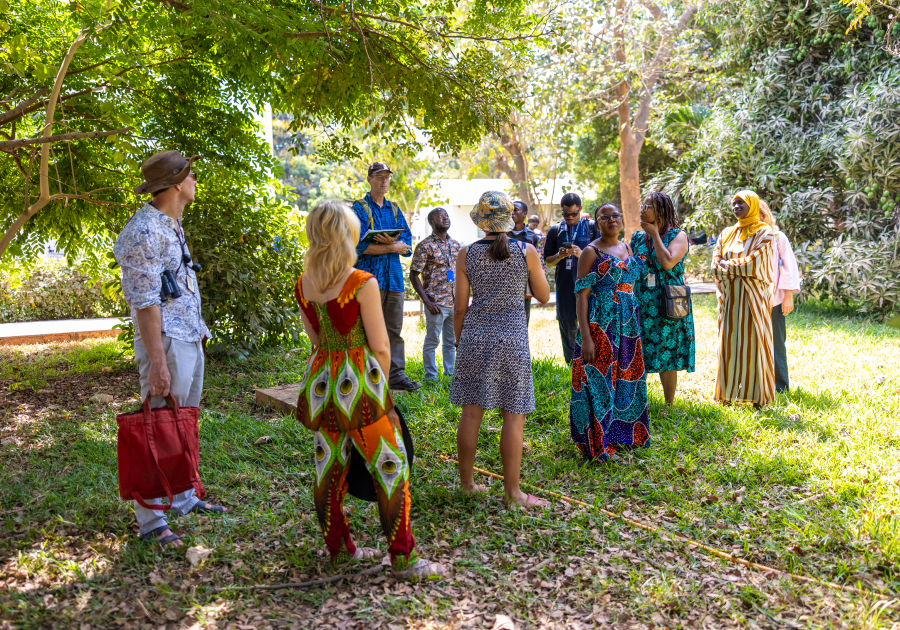
Nature Walk as part of the planetary health week
Planetary Health Week, running from 28th April to 3rd May 2024, aims to bring sustainability action and planetary health work and awareness to MRCG at LSHTM staff members on what we, as individuals and as an organization, can do in order to move towards a more sustainable, climate neutral, and as a result, healthy world. The goal is to inspire staff to be involved and take action at home and in their communities. The week is organised by the London School of Hygiene and Tropical Medicine’s (LSHTM) Planetary Health Network (PHN) in partnership with the Centre on Climate Change and Planetary Health (CCCPH) with support from the Planetary Health Cross-Cutting Programme and Theme at The Medical Research Council Unit The Gambia at the London School of Hygiene and Tropical Medicine (MRCG at LSHTM).
The Planetary Health Cross-Cutting Programme was established in 2020 both as part of the existing Nutrition theme and as a new cross-cutting programme to respond to the challenge of social and environmental changes caused by climate change that threatens human health. The objectives are to improve understanding on climate change and planetary health through research, foster connections globally to bring about change and co-create imaginative and scalable solutions in The Gambia and Africa as a whole.
As part of this year’s Planetary Health Week, activities at MRCG at LSHTM were designed to make climate change and sustainability more visible and understandable, and to provide a few everyday solutions that anyone of us could implement individually or at work. These include plastic recycling, a bring-and-share vegetarian potluck breakfast, an informative nature walk, a visit to the recycling and biogas plants at MRCG at LSHTM and overall tips on how we can live healthier and more sustainably.
In discussing why these specific activities were chosen, Dr Ana Bonell, Assistant Professor based at MRCG at LSHTM stated “These events were chosen by the Planetary Health Group here at MRCG at LSHTM to reflect some of our ongoing work on sustainability within the Unit and to raise awareness on sustainability and encourage action by staff members to reduce their environmental footprint.”
It is not uncommon for many to express feeling overwhelmed when it comes to combating climate change. Dr Zakari Ali, a Research Fellow working on climate and health also at MRCG at LSHTM, addressed these worries expressing “Tackling climate change may seem far away from individual control – leaving people concerned but feeling helpless on what they can do on their own to support wider national and international efforts. The activities for Planetary Health Week reflect the spectrum of sustainability challenges but also highlight the opportunities and provide simple ‘double duty actions’ that individuals can take to deliver both health and environmental benefits.”
The Planetary Health team at MRCG at LSHTM continues its efforts to attract funding to conduct world-class research on issues at the nexus of environmental change and health, including work on extreme heat exposure, sustainable diets and food systems, infectious disease emergence and the environmental footprint of health research and healthcare institutions such as MRCG at LSHTM. Many of those activities involve close collaboration with partners in government and in local institutions such as the University of The Gambia.
Says Kris Murray, Prof in Environmental Change and Health and co-Director of CCCPH at LSHTM based at MRCG at LSHTM “Sustainability has been placed at the centre of just about every sector and nearly all countries in the world have committed to limiting climate change and reversing widespread environmental degradation through multilateral environmental agreements. In practice, this requires unprecedented individual and collaborative action to chart a new course both at home and in our workplaces. It requires us to look up from what we’re doing and think for a minute on how we might do it better – the good thing is that saving carbon, waste and habitats will also help us save lives and improve livelihoods, which is exactly the reason many of us got into global health in the first place and regardless by what route or discipline.”
If you enjoyed this article and would like to build a career in global health, we offer a range of MSc programmes covering health and data, infectious and tropical diseases, population health, and public health and policy.
Available on campus or online, including flexible study that works around your work and home life, be part of a global community at the UK's no.1 public health university.
